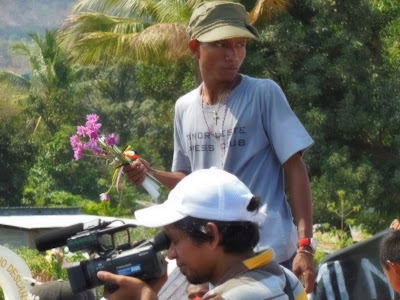 |
| Police, military perimeter guards and the public watch the 38th independence anniversary parade at the "widows village" of Kraras. Mobile photo: David Robie/PMC |
ON 28 November 1975, Timor-Leste made its fateful unilateral declaration of independence. A week later, a paranoid Indonesian military, fearful of an upstart "leftwing" neighbouring government, staged its brutal invasion and 24 years of repression and massacres followed.
On 17 September 1983, the infamous massacre of at least 300 civilians (probably a far higher number) took place at the village of Kraras and Wetuka River near Viqueque.
This heralded the end of the so-called ceasefire between Indonesian and Falintil forces and led to the long guerrilla struggle against Jakarta's harsh rule.
This week, the people of Kraras - the "village of widows" - proudly hosted the 38th anniversary of Timor-Leste independence; the real date, not the "rewritten" post-UN date. They also honoured the 30th anniversary of the Kraras massacre.
The massacre has been graphically portrayed in Timor-Leste's first feature film, Beatriz's War, and it was fitting that this movie should be screened to thousands of Timorese in an open-air arena at the independence festival this week.
























